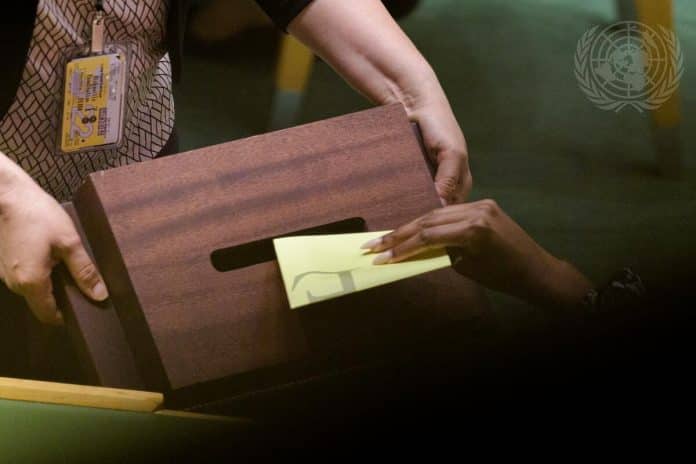With the EU elections fast approaching, elections worldwide in 2024 will see some 2 billion people eligible to vote. The importance of human rights to elections and electoral processes is more critical than ever. Human rights and democracy are closely interconnected, with democracy vital for promoting and protecting human rights. It is easy to talk about the existence of a link between human rights, democracy and elections, but how are our electoral rights enshrined in human rights law?
The Universal Declaration of Human Rights (UDHR), Article 21, defines the right to political participation. It is also codified under Article 25 of the International Covenant on Civil and Political Rights, which the Human Rights Committee describes as being at the core of democratic government based on the people’s consent. Regional human rights instruments such as the European Convention on Human Rights (ECHR) also ensure the promotion, respect, and protection of these fundamental rights at the regional level.

The right to political participation
The right to political participation is ‘important in empowering individuals and groups, and is essential to eliminate marginalization and discrimination’.
It involves three central rights:
- The right to take part in the conduct of public affairs.
- The right to vote and be elected.
- The right to have access to public service.
The right to vote and be elected is a fundamental human right, as stated in the UDHR and other international human rights instruments. It is linked to several other human rights that act as a prerequisite for a ‘meaningful electoral process’. These rights are the right to freedom from discrimination, the right to freedom of opinion and expression, the right to freedom of association and peaceful assembly, and the right to freedom of movement.
The Human Rights Committee, a body of independent experts that monitors the implementation of the ICCPR, defines the conduct of public affairs as ‘a broad concept which relates to the exercise of political powers, in particular the exercise of legislative, executive and administrative powers.’ Essentially, it can be understood as public administration as well as policymaking at the ‘international, national, regional and local levels’. Thus, the right to participate in public conduct guarantees that everyone is involved in public administration and decision-making.
The right to freedom from discrimination and the prohibition of all forms of discrimination, as stated in article 2 of the ICCPR, constitute the basis for political participation rights, including the right to vote and stand in elections and the right to equal access to public services.
Democracy, elections and human rights
‘Democracy, human rights and the rule of law are interdependent and mutually reinforce each other. Weakening one endangers the others,’ said Simon Walker, chief of the Rule of Law and Democracy section at UN Human Rights.
Free and fair elections constitute a key pillar of democracy, and the right to political participation which is enshrined in the Universal Declaration of Human Rights (UDHR) and the International Covenant on Civil and Political Rights (ICCPR) is a key tenet of democracy.
Elections allow people to freely express their will and exercise their right to participate in public affairs. The right to vote and be elected in ‘genuine’ elections is inherently connected to many human rights which are essential to ‘a meaningful and inclusive electoral process.’ These so-called prerequisite rights include the right to equality and non-discrimination, the right to freedom of opinion and expression, the right to freedom of association and peaceful assembly, and the right to freedom of movement.
Human rights norms in international law
Human rights are ‘inherent to all human beings, regardless of race, sex, nationality, ethnicity, language, religion or any other status.’ As the Universal Declaration of Human Rights (UDHR) states in its article 1, ‘all human beings are born free and equal in dignity and rights.’ Furthermore, article 2 establishes the right to freedom from discrimination based on ‘race, colour, sex, language, religion, political or other opinion, national or social origin, property, birth or other status.’
The UDHR enshrines a set of universal rights. However, the international human rights treaties establish obligations on States party to those conventions to protect those rights as such. The international human rights treaties include the International Covenant on Civil and Political Rights (ICCPR), the International Covenant on Economic, Social and Cultural Rights (ICESCR), the International Convention on the Elimination of All Forms of Racial Discrimination (CERD), the Convention on the Elimination of All Forms of Discrimination against Women (CEDAW), the Convention against Torture and Other Cruel, Inhuman or Degrading Treatment or Punishment (CAT), and the Convention on the Rights of the Child (CRC).
Additional Links on Human Rights and Elections:
UN Human Rights Office:
- 2024 elections are testing democracy’s health (OHCHR)
- Electoral year 2024: UN experts call for strengthening democracy and reversing global erosion of human rights (OHCHR)
- Human Rights and Elections – A Handbook on International Human Rights Standards on Elections(OHCHR | 2021)
- OHCHR and elections and human rights (OHCHR)
- OHCHR and equal participation in political and public affairs (OHCHR)
- Democracy and human rights (OHCHR)
- Electoral year 2024: UN experts call for strengthening democracy and reversing global erosion of human rights (OHCHR)
- Special Rapporteur on freedom of peaceful assembly and of association (OHCHR)
International Human Rights Legal Instruments
- International Covenant on Civil and Political Rights (OHCHR)
- Universal Declaration on Human Rights (UN)
- European Convention on Human Rights (Council of Europe)
- Human Rights Committee General Comment No. 25 – ICCPR (UN)
Other UN and EU information
- Human Rights (UN)
- Democracy (UN)
- Democracy and electoral rights (EC)
- Right to free elections (Council of Europe)
- Democracy and human rights (EP)

